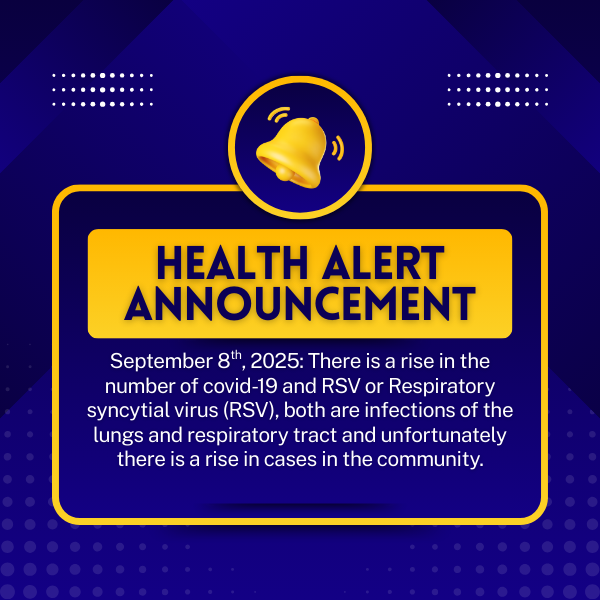
Recent Rise in Covid-19 and RSV Alert
For Covid 19:
-Stay up to date with your immunizations. Although vaccinated people sometimes get infected with the virus that causes COVID-19, staying up to date on COVID-19 vaccines significantly lowers the risk of getting very sick, being hospitalized, or dying from COVID-19.
-Practice good hand hygiene, like washing your hands regularly and cleaning commonly touched surfaces.
-Wear a mask around others if symptoms are present or positive test results.
-Physical distancing- putting physical distance between yourself and others can help lower the risk of spreading a respiratory virus. There is no single number that defines a "safe" distance, since the spread of viruses can depend on many factors. Generally, infectious droplets and particles build up closer to the person who is releasing them. The closer you are to someone who has a respiratory virus, the more likely you are to catch it.
-Testing for covid-19 can help you decide what to do next, like getting treatment to reduce your risk of severe illness and taking steps to lower your chances of spreading COVID-19 to others.
For more information https://www.cdc.gov/respiratory-viruses/prevention/index.html
For RSV:
When an adult gets RSV, they typically have mild cold-like symptoms, but some may develop pneumonia (an infection in the lungs). Adults who get very sick from RSV may need to be hospitalized. Severe RSV can be fatal for some adults.
RSV can sometimes also lead to worsening of serious conditions. RSV may not be severe when it first starts. However, it can become more severe after a few days into the illness. Early symptoms of RSV may include:
Runny nose
Eating or drinking less
Cough, which may progress to wheezing or difficulty breathing
Infants who get RSV almost always show symptoms. This is different from adults, who can sometimes get RSV and not have any symptoms. In very young infants (less than 6 months old), the symptoms of RSV may include:
Irritability
Decreased activity
Eating or drinking less
Apnea (pauses in breathing for more than 10 seconds)
Many infants will not have a fever with RSV infection.
CDC recommends you use one of these two tools to protect your baby from getting very sick with RSV:
An RSV vaccine given to the mother during pregnancy
An RSV immunization given to infants and some older babies
https://www.cdc.gov/respiratory-viruses/risk-factors/index.html
Available if you need: masks and covid (some include influenza A and B) testing.
Thank you
Michelle Parris-Nielsen
Community Health RN
Bad River Health & Wellness Center
53385 Nokomis Road
Ashland , WI. 54806
Work: (715) 979 8368 Ext 4642
Cell (715)-292-9569
M.Parris-Nielsen@BadRiverHWC.com




